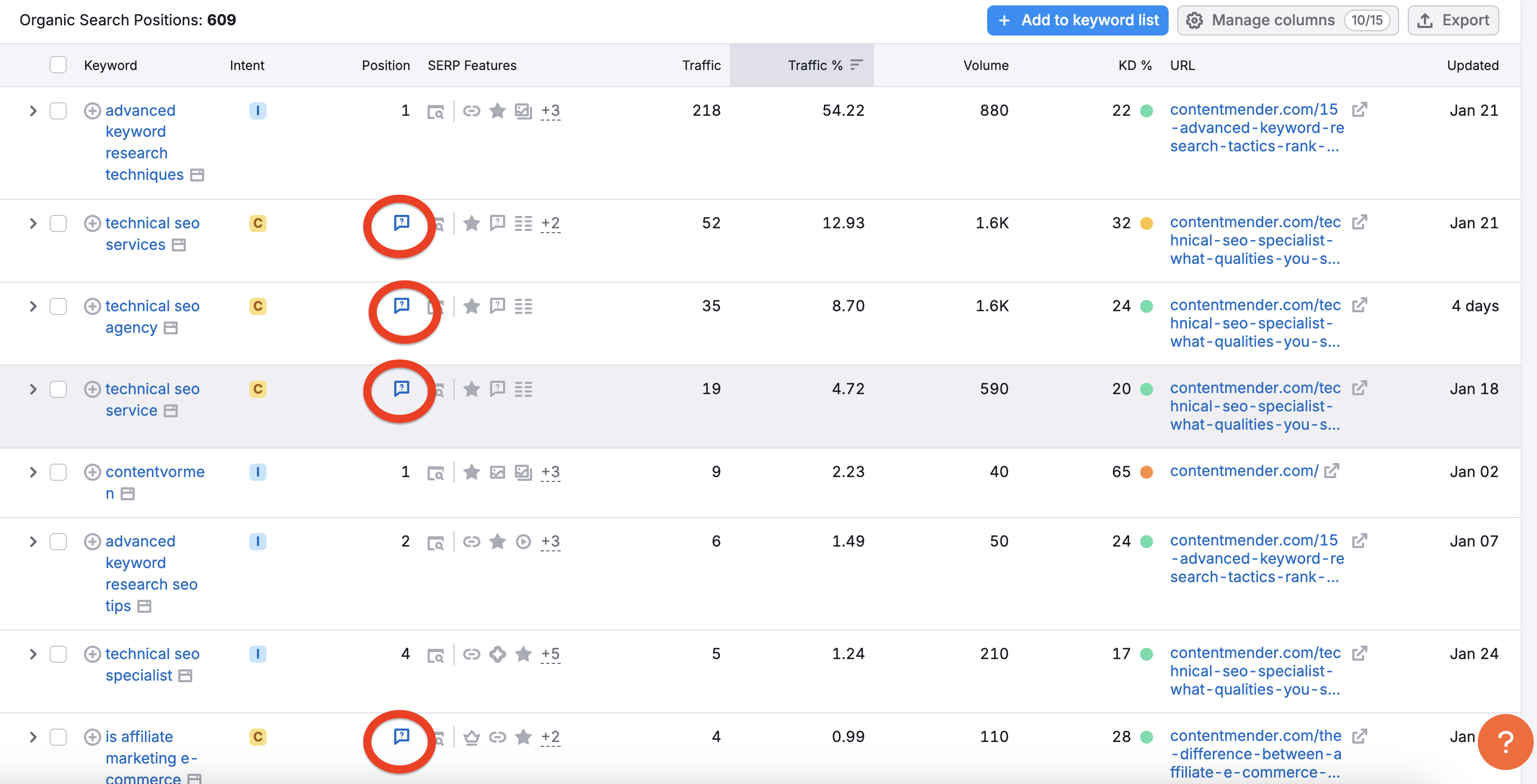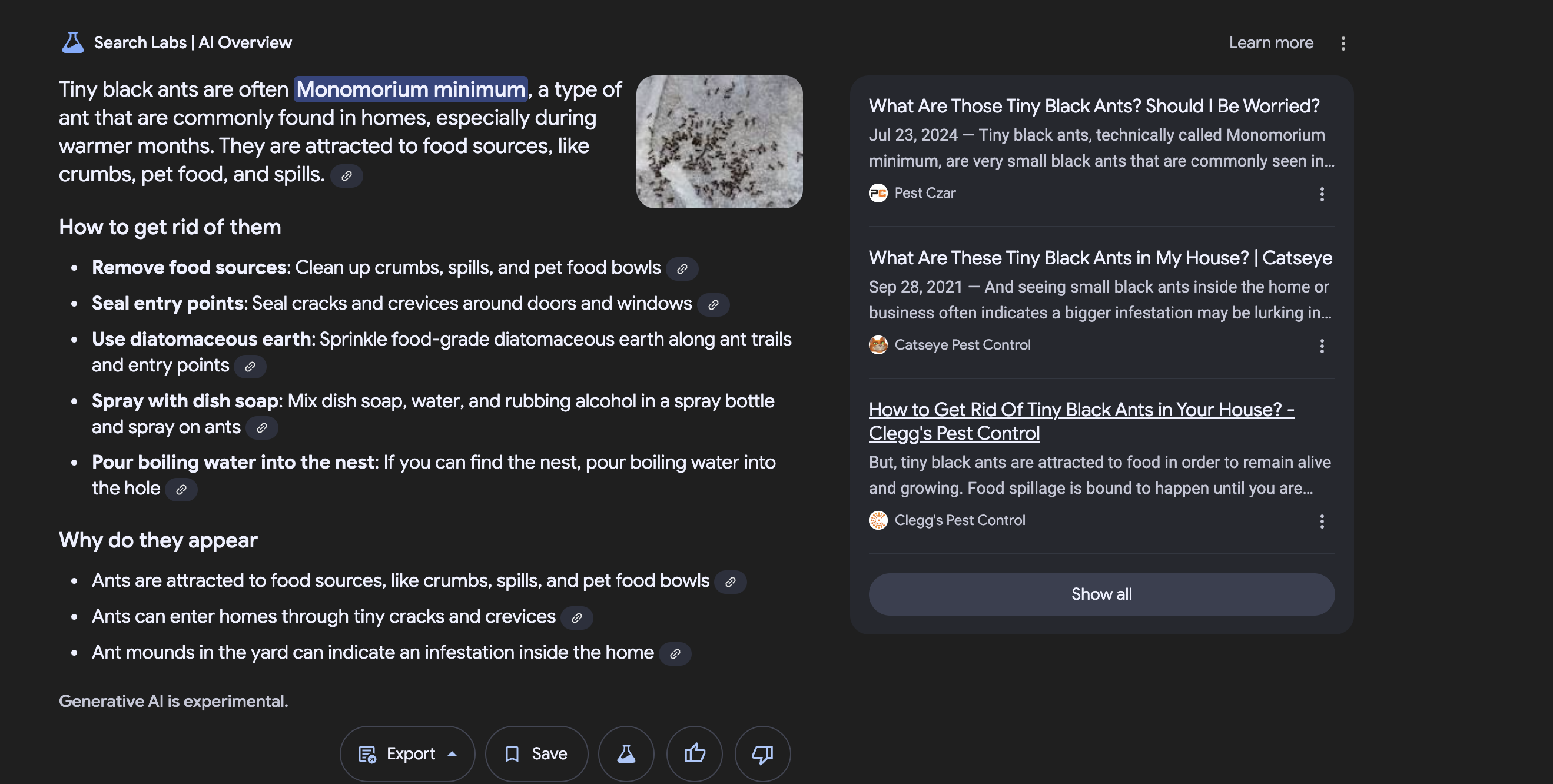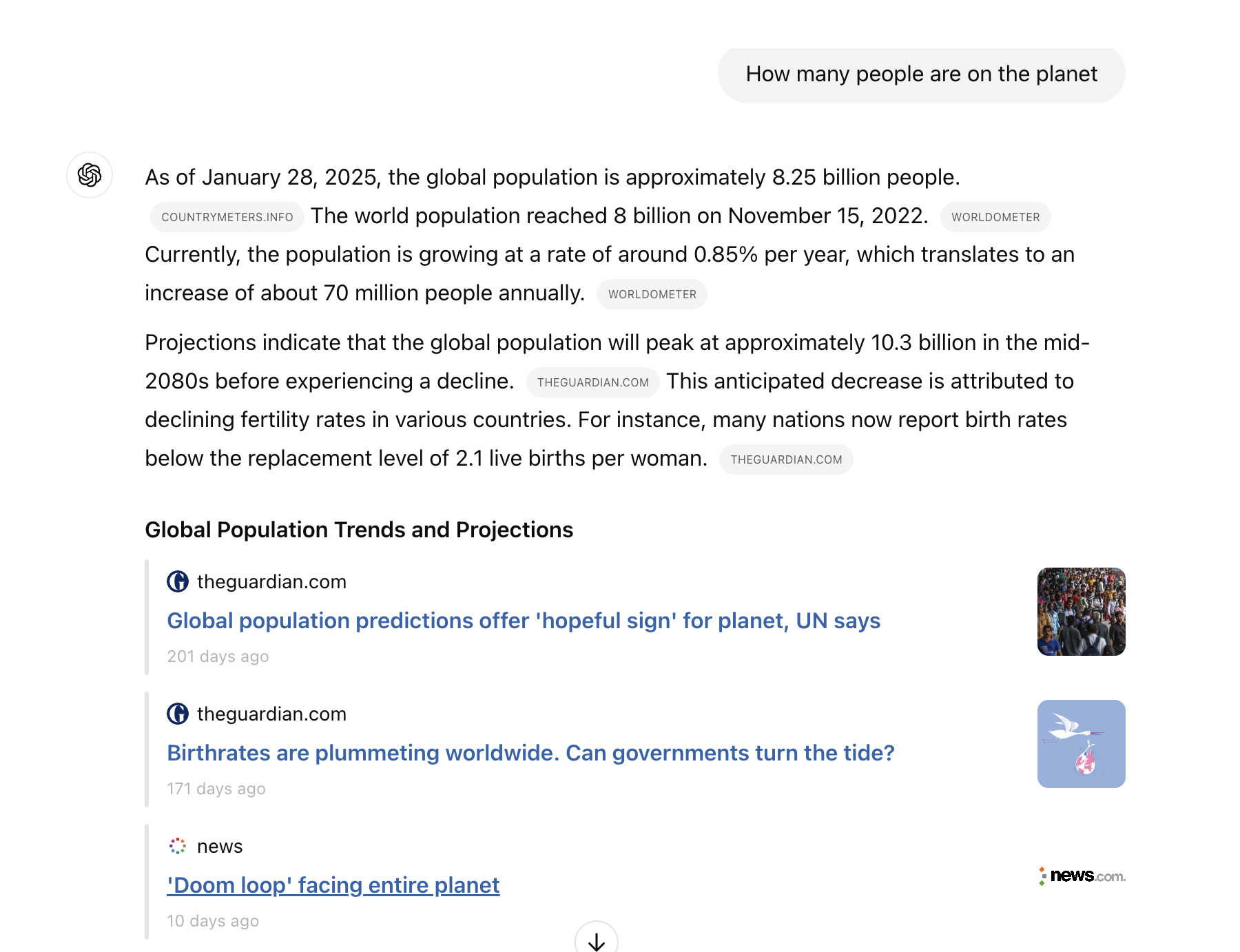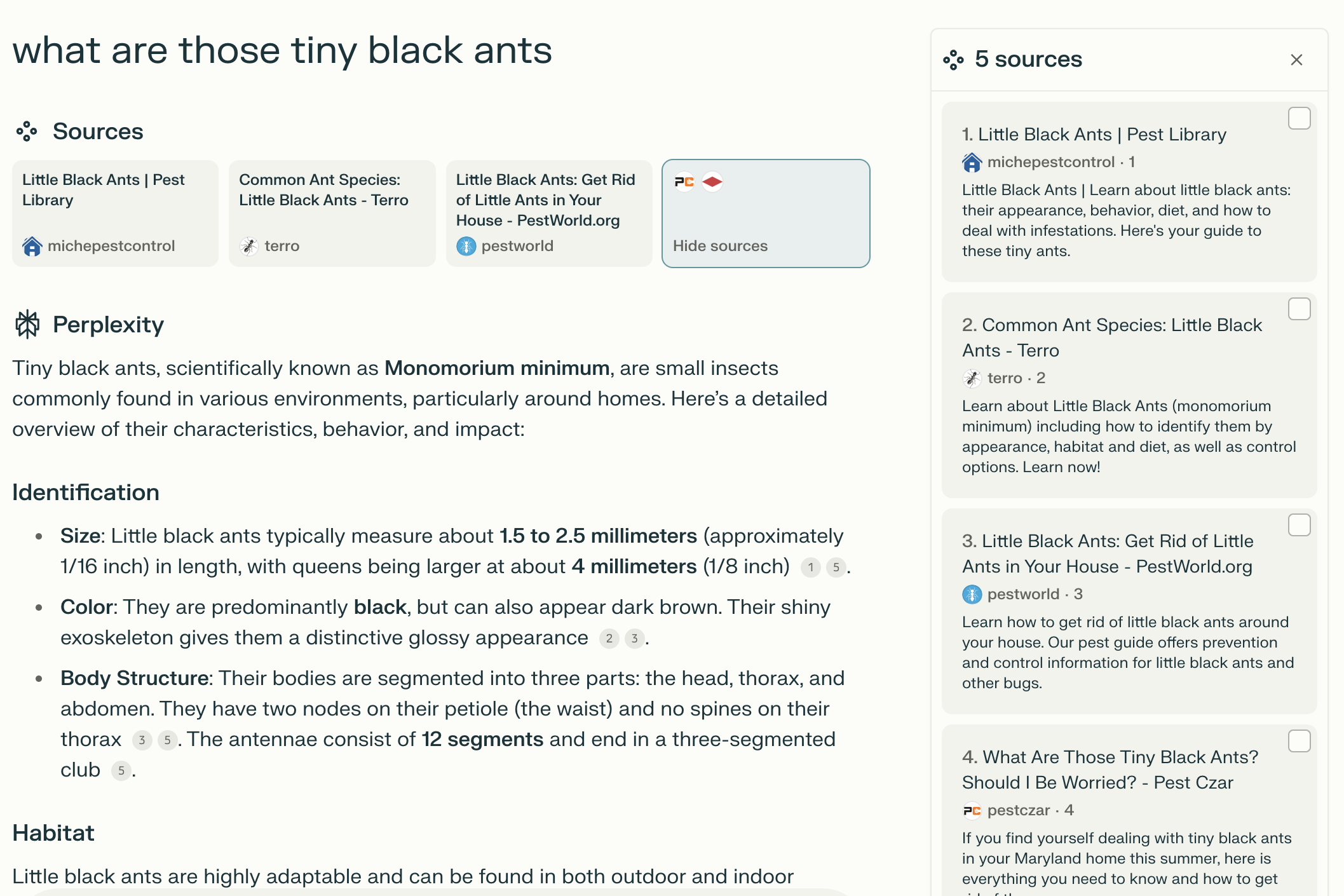The world of SEO in 2025 is in a fuzzy place.
When I first started in SEO five years ago, we were all asking questions like, “Is link building dead?” and “Is content really king?”
Now, with the rise of AI-based searches and Google’s Gemini, completely new disciplines of SEO have emerged, like Answer Engine Optimization (AEO) and Generative Engine Optimization (SEO). How many acronyms are we expected to learn?
Long gone are the days when organic blue links dominate search results. People expect fast answers, and you need to be able to match those user questions as closely word-for-word as you can to win.
Just take a look at how much things like answer boxes dominate search anymore.

On top of this, we now have to compete with Google’s own AI just to be shown side-by-side with its results.

This doesn’t mean that SEO is dead or something dramatic that people like to shout anytime there’s change.
In fact, a whole new channel of search is opening up right before our eyes and, while it won’t replace SEO, it will certainly transform the way we search for information in the future.
What Is Generative Engine Optimization (GEO)?
Generative Engine Optimization is the practice of optimizing website content to rank for AI-based search results on platforms like ChatGPT and Perplexity.
“But I thought ChatGPT was just a chatbot–now it has search results?”
As we noted on our last blog, ChatGPT’s newest model 4o can scrape results from its own internal database and Bing to deliver search results–with citations attached!
If you look at the chatbar, you can see an option to search the web without having to leave ChatGPT.
 While still in its infancy, the possibilities of optimizing for AI-based searches are intriguing. I imagine ChatGPT’s index will only become more robust over time as well.
While still in its infancy, the possibilities of optimizing for AI-based searches are intriguing. I imagine ChatGPT’s index will only become more robust over time as well.
For information-based searches, especially when it comes to research, the idea of showing up on ChatGPT-style results will be a game-changer.
Should I Really Be Optimizing for GEO?
Does anyone remember when voice search was the next big thing? Well, this one is kind of different.
I think no one reading this would deny that AI is going to have a tremendous impact on the digital world as we know it, especially for SEO.
One thing that makes GEO unique is that it’s a partially separate discipline from SEO. GEO can end up opening up a huge amount of competitors to Google, which would make things pretty interesting.
GEO won’t replace SEO by any means, but as more users flock to platforms like ChatGPT to automate everyday tasks and requests, you better be sure you want your content to show up high on its list of results.
10 GEO Best Practices to Get Started
Oh, great. Now we have to change our entire strategy to appear for GEO results on ChatGPT. What’s next?
The good news is that by following many of the same SEO practices we’ve preached for years, you’re also bound to show up on AI-based searches.
However, through our experience working with these platforms, we’ve discovered a few practical tips that can help you rank higher on them!
1. Use Author Tags
Authority matters when it comes to AI-based chatbots, and many of the indexes that these bots are trained to scan come from trusted, high-authority websites. The citation in the screenshot above is from OpenTable, showcasing that AI-based searches are very picky about their results.
Chances are, if someone is looking for an answer to a medical question, it’s not going to pull answers from an alternative-based website.wordpress.com blog that gets no traffic.
One trick we’ve found that has really helped many of our clients start showing up in these results is implementing author tags on all of their content, both on their native website and in guest posts. This helps establish credibility with search engines like Google and Bing, which chatbots like ChatGPT and Perplexity will then use to factor into its results.
2. Index On Different Search Engines
As we mentioned previously, ChatGPT is pulling Bing results, meaning it’s time to get your website indexed on Bing. However, given the sheer number of chatbots and search indexes available, I’d be sure to send a sitemap to all search engines, including Bing, Yahoo, DuckDuckGo, and any others you can find.
3. Refresh Content Regularly
Another unique quirk that chatbots like ChatGPT and Perplexity favor is fresh, new content. If your content includes dates, be sure to update them to the current calendar year. AI-based engines are likely to ignore content from previous years that they feel is outdated.
Furthermore, it’s generally best practice to refresh old content to prevent content decay.
4. Provide Specific, Real-World Examples
This tip is unique to information-based queries, but we suggest altering your approach to content writing.
In the past, it was common for SEO-based writing to be very stiff. For example, people would often optimize for keywords, such as “local SEO services,” and writing content, such as:
Local SEO services seek to improve the rankings for local-based keywords searches, such as “near me” searches, using a combination of keyword research, local-based content, and mobile optimization.”
However, people aren’t typing in “local seo services” into ChatGPT–instead, they’re typing in queries like “how can my business rank #1 in my area for the keyword “plumber near me” over Google search.” To rank for that search, you might have to adjust your copy for something a bit more conversational, such as:
If you want to rank #1 in your area for keywords, such as “business near me,” I would start off by first collecting a list of keywords related to your business and running them through Google Ad’s free Keyword Planner tool. This tool will also help you see what competitors are bidding on these keywords so you can determine which ones tend to convert the most and bring the most revenue…
However, there are several ways to approach how you write for AI-based search engines, with more examples below.
5. Chunk Content Into Listicles
If you’ve used tools like ChatGPT long enough, you know it loves to collect and distribute results in listicles.
Listicles have long been a favorite practice in SEO, but seem to deliver stronger results now for AI-based search engines. Taking the last example from above, here is another way you can adjust your writing to rank in AI-based results like so:
To rank #1 for local-based keywords in your area, try these steps:
- Perform Keyword Research: (description)
- Insert Local into On-Page Content: (description)
- Build Local Citations: (description)
- Optimize for Mobile: (description)
6. Use Facts and Statistics
Think about what people use tools like ChatGPT for. In many cases, they’re looking for quick, consumable information, such as facts and statistics for research.
When possible, try incorporating this data with relevant citations to aid in social proof.

Similar to using author tags, it also pays to implement specific quotes from credible sources that can add in giving authority to your blog.
7. Cap Off Content with FAQs
FAQs are an amazing addition to any blog. They can serve as a summary for readers and also help you rank for Featured Snippets on Google.
As we’ve found, FAQs can also help you rank for AI-based results, especially since most AI-based searches are looking for quick answers to common questions.
8. Structure Data Accordingly
Another important aspect of content writing is its structure. For example, we can help search crawlers understand our content and information architecture by separating content with headers and meta tags, and we can do the same for AI-based search engines.
For added benefits, I also recommend incorporating structured data, especially as it relates to local content, for added GEO and SEO value.
9. Follow E-E-A-T Guidelines
The best part of GEO optimization is that you can still rank for AI-based results by following many of the same SEO best practices we’ve preached for years.
In particular, Google has outlined E-E-A-T guidelines (Experience, Expertise, Authoritativeness, and Trustworthiness), which are designed to improve the quality of your writing and help it rank higher in traditional results.
As we’ve discussed, all four of these categories are heavily involved in ranking for GEO results, whether it’s implementing author tags for more authority or making content more conversational for experience and expertise.
10. Run Your Content Through AI Systems for More Tips!
This tip seems too obvious, but most of us overlook this vital step.
One benefit of AI-based search over traditional search indexes is that they are interactive and can actually coach us on how to properly optimize content to meet their internal algorithms. Now, you’ll have to work on writing the write prompt for this to really work.
For example, I might type something like, “Hey ChatGPT, recommend me some tips to help this article rank higher in GEO searches once it’s published.” From there, you’ll need to play around with it a bit to provide more actionable insights and not just every piece of fluff it can spit at you at once.
Another tool that the team at ContentMender has taken a liking to is the AI-suggestions tool from Grammarly. Not only is Grammarly an essential tool for grammar and editing, but the Rewrite tool provides really good insights on how to improve your copy for specific audiences–unlike so many other AI writing tools on the market.
Is GEO the Future of Search?
We’re not going to sit here and call this or that the future of search, but very clearly the benefits and rise of GEO should not be ignored by businesses or SEO experts. GEO will not replace SEO by any means, but it will more than likely be a huge new endeavor that many businesses are going to want to explore in the coming years.
By following the tips outlined above, maintaining SEO best practices, and staying on top of trends, you can be a GEO rockstar and leave your competitors in the dust.
FAQs
What is Generative Engine Optimization (GEO)?
Generative Engine Optimization refers to the practice of optimizing website content to rank in AI-based search results on platforms like ChatGPT and Perplexity.
How is GEO different from traditional SEO?
GEO focuses on optimizing for AI-powered platforms, which prioritize conversational queries, fresh content, and high-authority sources. Traditional SEO is more focused on search engine rankings like Google and Bing.
Why should I optimize for GEO?
With the rise of AI-based searches, appearing in these results can boost visibility, especially for research and information-based queries.



